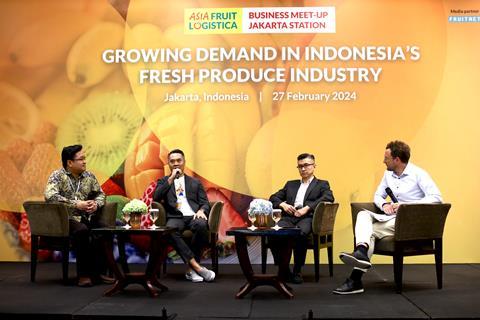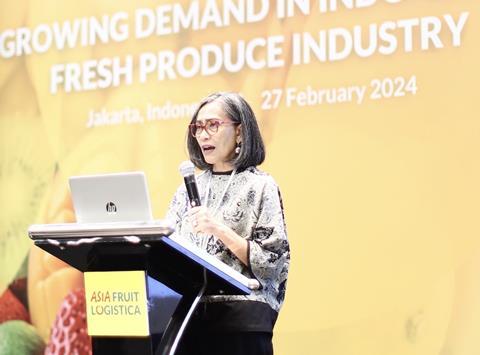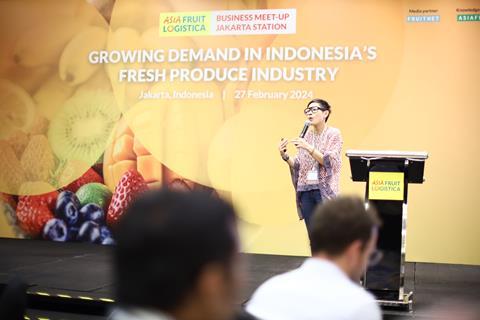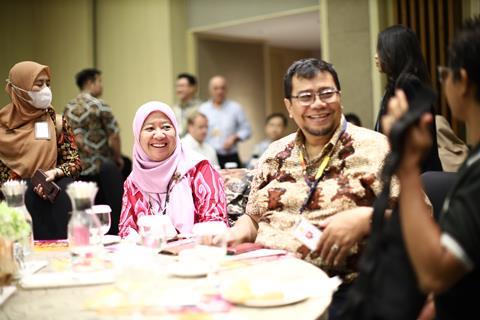Asia Fruit Logistica’s Jakarta Business Meet-Up highlights opportunities and challenges to building Indonesia’s fruit consumption

Fruit consumption remains relatively low in Indonesia, and more work must be done to boost availability and awareness of the health benefits to drive demand.
That was one of the takeaways from Asia Fruit Logistica’s Jakarta Business Meet-Up, which brought together leading players from across Indonesia’s fresh produce business for a day of networking and knowledge-sharing on 27 February at the Pullman Jakarta Hotel.
The Jakarta Business Meet-Up was the first in the trade show’s new series of content-backed Asia networking events. Asia Fruit Logistica has launched the Business Meet-Ups to deepen its connections in key markets across Asia and build even greater momentum for the trade show’s return to Hong Kong on 4-6 September 2024.
In her keynote presentation on Indonesian consumer behaviour and retail trends in fresh produce, Ira Soekirman, director of Roy Morgan Research, said consumption of fruit lagged behind vegetables in the country. Soekirman cited December 2023 data from Roy Morgan’s Single Source, which she described as the largest syndicated survey on Indonesian consumer behaviour.
“Indonesians have always had a high consumption of vegetables – they’re a core part of the diet, with 88 per cent of consumers [reporting] eating them,” she said. “Fruits are still seemingly seen as somewhat more special, and the consumption is lower, with only 63 per cent of consumers eating them.”
Consumption of both vegetables and fruit declined during the pandemic, according to Soekirman. While consumption of vegetables has quickly rebounded to pre-pandemic levels, she said fresh fruit showed a slower recovery. “This could be due to availability, the higher price, as many people are watching their spending, or the perceived need or habit of eating fruit compared to vegetables.”
While predicting that fruit consumption would increase with improved availability and more affordable pricing, Soekirman said greater efforts were required to promote the value of eating fruit and make it a habit like consuming vegetables.

In an ensuing panel discussion, ‘Indonesia’s future in focus’, leading industry figures agreed with her assessment.
“Consumption of fresh fruit has been pretty much flat the past ten years, and per capita consumption is still around half the recommended WHO standard,” said Yuyuh Sukmana, South East Asia regional manager for Vanguard International. “It shows that we haven’t really done our homework. As an industry, I think we need more PR activities to encourage people to consume more fruits.
“For me, the key word is collaboration – we need to be agents of change, either through an association or a taskforce. It’s good to get together like this [at the Asia Fruit Logistica Business Meet-Up], but we need to follow it up with an action plan involving all stakeholders – government, local producers, importers and so on.”
Supply challenges
Significant challenges remain on the supply side, however. Indonesian grower-marketer HaloFresh has focused on developing supply of high-quality branded Cavendish bananas to the domestic market. “The market has a lot of potential. If we can introduce the right product and educate consumers they will eat more fruit,” he said. “The challenge as a producer-marketer is that in order sell at affordable prices, we need to have more volume and scale. And it’s hard to get scale, to get those large tracts of land to plant.”
Hendry Sim, vice director of leading importer-distributor Laris Manis Utama, agreed that it was difficult to grow consistent quality fruit for domestic producers. “Retailers are not getting enough quality fruit – it’s hard to become a grower in Indonesia with all the challenges like weather, funding, small landholdings, and disease pressures. Fusarium wilt is also a big issue for the banana industry.”
Imported fruits also face supply challenges, attendees heard. Indonesia’s import licensing system restricts the volume and range of imported fruits. Unpredictability and uncertainty over the government’s issuing of import quotas makes it difficult for buyers and suppliers to plan supply programmes and promotions.
Despite these hurdles, Sim pointed out that social media channels were helping to grow demand for new imported fruits.
“The potential [for imports] is always there because of the growing GDP, increasing disposable income, and greater knowledge [of products] with international media exposure,” he said. “For example, we haven’t invested a lot of money in marketing blueberries, and the demand has just increased by itself. Some of this is due to people posting on TikTok, Instagram and YouTube saying what a healthy fruit it is. Previously, eating quality was an issue for blueberries, but the new varieties have great crunch, taste and aroma.”
Retail channels
Looking at where Indonesian consumers buy their fresh produce, Soekirman highlighted the strength of the country’s traditional retail trade. Most grocery buyers continue to purchase fresh fruit and vegetables at the pasars (traditional markets), she noted. In urban areas, warungs (neighbourhood stores) are also an important destination for buying fruit and vegetables, she noted. “Minimarkets are not yet seen as a place to buy vegetables and fruits, though they’ve been increasing share since the pandemic,” she said. “Supermarkets play an important role for general grocery buying but for fruit and vegetables they only account for 5 per cent [of grocery buyer visits],” she said.
Specialty fruit stores are also growing rapidly in the major cities as a place to buy fresh fruit, Soekirman noted. “These stores cater to a select few, but they’ve seen a big increase each year since just before the pandemic,” she said. “Although not many people are buying from these stores, the volume can be quite high.”
Sim agreed the specialty stores were performing strongly. “When they can sell volume, they can reduce the margin – they have the availability and a nice ambience with airconditioned stores. Young families are opting to go to these stores instead of the wet markets,” he said. “The stores are mainly owner-operated so they can adapt quickly to supply and market conditions. The owners have in-depth knowledge of fruits and it’s hard to pass that on to other stores.”

Fresh innovation
In other talks at Asia Fruit Logistica’s Jakarta Business Meet-Up, Beleaf Farms’ chief executive Amrit Lakhiani outlined how the ag-tech start-up was helping Indonesian farmers to overcome a fragmented and inefficient supply chain with its Farming-as-a-Service (FaaS) platform.
The company started out farming hydroponic leafy greens but has since expanded into open-field production and a wide range of root vegetable and fruit lines. Beleaf is supplying retailers and online channels in Jakarta as well as exporting to six countries.
“We’re using the expertise and technology we have developed in our own production to bring the same benefits to existing farmers,” said Lakhiani. “This way, we can boost the quality and productivity of the Indonesian industry and showcase the best local products to foreign markets.”
Margareta Astaman, founder and chief executive Java Fresh, also delivered a case study on developing a successful fruit export business. The tropical fruit exporter works with more than 3,000 farmer-partners and has six packhouse facilities across three islands, shipping to 23 countries, primarily in Europe. She explained how Java Fresh had developed solutions to key pain points for Indonesian fruit exports, such as supply continuity, quality assurance and certification, pesticide residue issues and lack of technology.

Roadshow continues
Following the Business Meet-Up in Jakarta, the roadshow heads to Mumbai, where Asia Fruit Logistica is the Official Partner of Fresh Produce India on 21-22 March, organised by Fruitnet. Thailand is the next stop, with a Business Meet-Up in Bangkok on 3 April. The final stop is Shanghai, where Asia Fruit Logistica hosts its China Business Meet-Up on 27-28 May.
For more information on the Asia Fruit Logistica Business Meet-Ups, visit the website: www.asiafruitlogistica.com/business_meet-ups/



